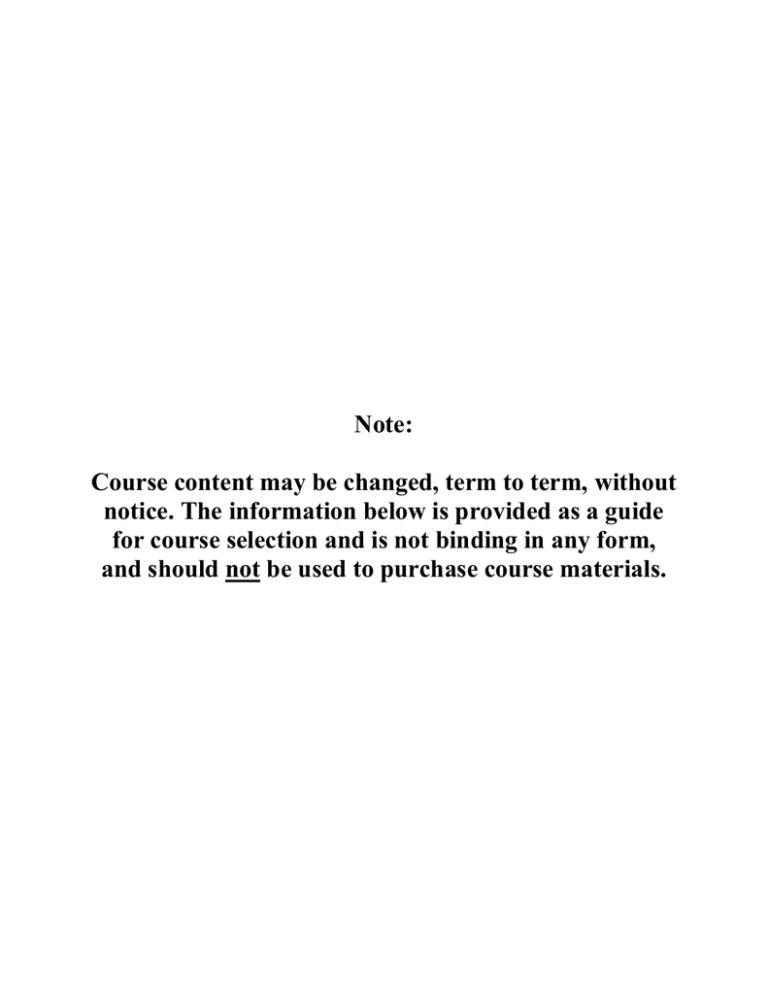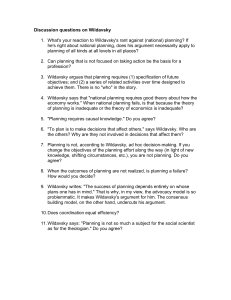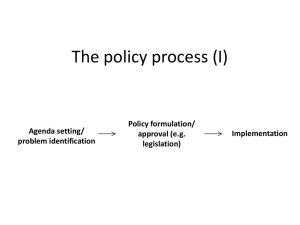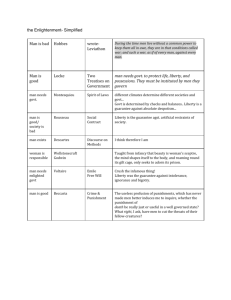Note: Course content may be changed, term to term, without
advertisement

Note: Course content may be changed, term to term, without notice. The information below is provided as a guide for course selection and is not binding in any form, and should not be used to purchase course materials. GOVT 462 Syllabus COURSE SYLLABUS GOVT 462 PUBLIC FINANCE AND BUDGETING COURSE DESCRIPTION Fiscal and monetary policy, taxation and the budget process in government. RATIONALE Government Majors within a Politics and Policy Specialization and those pursuing a Government or Politics and Policy Minor are required to demonstrate an understanding of a Biblical Christian worldview as the foundation for public policy analysis, which comprehends conceptualization, formulation, and implementation of public policy within a federal framework of national and state policy concerns. This policy course requires students to examine the federal budgetary process as to methodology, taxation and expenditures, politics, and reforms. I. PREREQUISITES For information regarding prerequisites for this course, please refer to the Academic Course Catalog. II. REQUIRED RESOURCE PURCHASES Click on the following link to view the required resource(s) for the term in which you are registered: http://bookstore.mbsdirect.net/liberty.htm III. IV. ADDITIONAL MATERIALS FOR LEARNING A. Computer with basic audio/video output equipment B. Internet access (broadband recommended) C. Microsoft Word (Microsoft Office is available at a special discount to Liberty University students.) D. Public Finance Review Journal (found at Sage Journals Online: Liberty University Online Journal) E. Budget and Economic Outlook Journal (found at Congressional Budget Office: Liberty University Online Journal) MEASURABLE LEARNING OUTCOMES Upon successful completion of this course, the student will be able to: A. Evaluate the role and jurisdiction of government relative to social and economic welfare from a Biblical worldview. B. Discuss or delineate a Biblical perspective on property and liberty of conscience. Page 1 of 3 GOVT 462 Syllabus V. C. Compare and contrast the moral and legal duties of our constitutional republic, which includes an originalist understanding of the relationship between Article 1, Section 8, Clause 1 (General Welfare Clause) and the rise of social welfare policy and programs currently part of US budgetary authority. D. Define the vocabulary of the federal budget process. E. Analyze the federal budget process, have a working knowledge of statutes which govern the process, and critique the constitutional authority for taxation policies and expenditures. F. Analyze the federal budget for purposes of reform and downsizing. G. Evaluate the roles of both the executive and legislative branches as each impacts and affects budgetary authority, priority, and processes. H. Recall the organization of the national government, specifically the executive departments and agencies which oversee the financial regulatory and rule-making processes and public program expenditures. I. Interpret a US Budget. J. Critique policy paper targeting the nature and scope of the federal budget. COURSE REQUIREMENTS AND ASSIGNMENTS A. Textbook readings and lecture presentations/notes B. Course Requirements Checklist After reading the Syllabus and Student Expectations, the student will complete the related checklist found in Module/Week 1. C. Discussion Board Forums (5) Students will be required to complete 5 Discussion Board postings consisting of 1 thread and 2 replies to classmates’ posts. Threads must contain 300–450 words while replies must contain at least 250 words each. Proper spelling, grammar, and punctuation are expected. D. Policy Paper Review and Critique (2) Students will be required to review and critique 2 policy papers. The title of each article to be reviewed will be due prior to submitting the completed papers. Each Review and Critique Paper must be between 5 and 7 pages. E. Quizzes (2) Students will be required to complete 2 open-book quizzes, which will consist of 25 randomized multiple-choice questions to be completed within 1 hour. Quizzes will test students on their knowledge of budgetary terms and acronyms, as well as budgetary methodology. F. Exams (2) Students will be required to complete 2 exams, which will cover conceptual material found in the texts and assigned readings. Both exams are closed-book, Page 2 of 3 GOVT 462 Syllabus and will consist of 50 randomized true/false and multiple-choice questions to be completed within a timed 2-hour time frame. VI. COURSE GRADING AND POLICIES A. Points Course Requirements Checklist Discussion Board Forums (5 at 100 pts ea) Policy Paper Title (2 at 10 pts ea) Policy Paper Review and Critique (2 at 90 pts ea) Quizzes (2 at 50 pts ea) Exams (2 at 100 pts ea) Total B. 10 500 20 180 100 200 1010 Scale A = 900–1010 B = 800–899 C = 700–799 D = 600–699 F = 0–599 C. Late Assignment Policy If the student is unable to complete an assignment on time, then he or she must contact the instructor immediately by email. Assignments that are submitted after the due date without prior approval from the instructor will receive the following deductions: 1. Late assignments submitted within one week of the due date will receive a 10% deduction. 2. Assignments submitted more than one week late will receive a 20% deduction. 3. Assignments submitted two weeks late or after the final date of the class will not be accepted. 4. Late Discussion Board threads or replies will not be accepted. Special circumstances (e.g. death in the family, personal health issues) will be reviewed by the instructor on a case-by-case basis. D. Extra Credit Policy There is no extra credit. E. Disability Assistance Students with a documented disability may contact Liberty University Online’s Office of Disability Academic Support (ODAS) at LUOODAS@liberty.edu to make arrangements for academic accommodations. Further information can be found at www.liberty.edu/disabilitysupport. Page 3 of 3 COUR ### Course Schedule COURSE SCHEDULE GOVT 462 Textbooks: Wildavsky & Caiden, The New Politics of the Budgetary Process (2004). Streeter, The Federal Budget Process (2010). MODULE/ WEEK READING & STUDY 1 Wildavsky & Caiden: ch. 2, forward, preface, glossary, acronyms Streeter: ch. 10 U.S. Constitution Excerpts 2 presentations Course Requirements Checklist DB Forum 1 Quiz 1 10 100 50 2 Review Wildavsky & Caiden: ch. 2 Streeter: chs. 1 – 5 Federal Budget Process Excerpts 1 presentation 2 articles Policy Paper Title Submission 10 3 Wildavsky & Caiden: chs. 3 & 6 Streeter: chs. 6 & 7 1 presentation DB Forum 2 100 4 Wildavsky & Caiden: ch. 8 Streeter: ch. 8 4 articles Policy Paper Review and Critique Exam 1 90 100 5 Organization of the Executive Branch Organization of Congress 1 presentation 1 lecture note Quiz 2 50 6 Review Wildavsky & Caiden: ch. 6 U.S. Constitution Excerpts 2 presentations 2 articles Policy Paper Title Submission DB Forum 3 10 100 7 Wildavsky & Caiden: ch. 7 Streeter: chs. 11 & 12 1 presentation 5 websites DB Forum 4 100 8 Wildavsky & Caiden: ch. 9 Streeter: ch. 9 1 presentation 8 articles DB Forum 5 Policy Paper Review and Critique Exam 2 100 90 100 TOTAL 1010 ASSIGNMENTS POINTS DB = Discussion Board NOTE: Each course week (except Module/Week 1) begins on Tuesday morning at 12:00 a.m. (ET) and ends on Monday night at 11:59 p.m. (ET). The final week ends at 11:59 p.m. (ET) on Friday.





